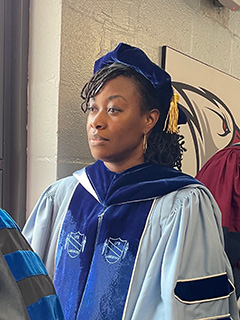2020 New Century Scholars Research Grant
Piecing it Together
 When Danai Kasambira Fannin began her journey into researching caregiver-mediated communication intervention for infants and toddlers with autistic traits, she never imagined her experience would eventually help both of her children, who are autistic. By the time they were diagnosed at ages 3 and 4, she knew very well that getting them the right help and early was going to be key to their outcomes.
When Danai Kasambira Fannin began her journey into researching caregiver-mediated communication intervention for infants and toddlers with autistic traits, she never imagined her experience would eventually help both of her children, who are autistic. By the time they were diagnosed at ages 3 and 4, she knew very well that getting them the right help and early was going to be key to their outcomes.
“Because I had just completed my postdoc and spent all this time with infants and toddlers and their caregivers, I knew enough to contact early intervention when my daughter was not communicating at 14 months,” she recalls. “I felt like I was going through something very familiar.”
This fortunate advance knowledge almost didn’t come to be. When Danai was an undergraduate at Bradley University, she thought she wanted to pursue advertising. It was during her senior year, she found out she needed one 300-level class to graduate. Her father, who was a professor at the university, asked his colleague if Danai could be allowed into an education-major-only class on language development. Although the university no longer had a speech-language pathology program, a former speech-language pathology professor taught the course. The class watched a documentary about a young girl, Anna, who had been isolated much of her life. The film showed specialists working with the child, teaching her many basic skills, including speaking. Once Danai learned that SLPs were part of this undertaking, she was intrigued.
“I knew that’s what I wanted to do. It looked like incredible work,” she recalls. “I was upset I didn’t learn what speech-language pathology was before this. My little brother had been treated by an SLP for a lisp when we were children, but I guess I didn’t realize what was happening at that time.”
Danai went on to pursue post-baccalaureate work at Southern Illinois University and attended Saint. Louis University for her master’s degree and then the University of North Carolina, Chapel Hill, for her PhD. During her post-doctoral work at the University of California, Los Angeles, she helped with clinical trials for young children with autistic traits who came from populations underrepresented in research. Later, at North Carolina Central University in 2019, she teamed up with a child psychiatry researcher at Duke University. They analyzed all North Carolina public-school data to see what the primary diagnoses were for children with individualized education plans (IEP), finding that Black or bilingual children in rural districts were more likely identified as having an intellectual disability (ID) rather than autism, when there is no documented reason why this should differ by race/ethnicity, geography, or language background. If these are misdiagnoses, says Danai, that could have consequences for the types of support children receive.
“There is nothing wrong with having ID, and it does co-occur with autism, but autism classrooms are set up differently than ID classrooms,” says Danai. “Accurate identification is so crucial, and we want to know why it wasn’t happening.”
This led to Danai’s 2020 ASHFoundation New Century Scholars Research Grant, designed to address determinants of diagnosis of Black children in North Carolina. Preliminary data showed that when it came down to professionals flagging signs of a disorder, many were not comfortable or equipped to engage with caregivers. Educators and SLPs often said they were not qualified to make diagnoses and worried about a parent’s reaction to their evaluation recommendation. Another common thread was that Black parents oftentimes had negative experiences getting their children evaluated, which was compounded by a lack of training for pediatricians and the schools.
“That’s when the breakdown happens – during that crucial conversation between the provider and caregiver. It’s how we end up with 8-year-old kids finally getting noticed, who were probably getting in trouble and disciplined instead,” explains Danai.
When Danai applied for funding through the ASHFoundation, her goal was to collect pilot data. That data, in turn, has since been used to apply for further external funding from the National Institutes of Health. “Although I was off to a slow start, due to the pandemic slowing human subjects research, the foundation funding has given me the opportunity to cite relevant pilot data, which is so crucial to justifying my proposed research.” Danai hopes to learn about how to enhance the diagnostic process for Black and Hispanic families to promote better access to services.
“Ultimately, I want to see some changes in the IEP process so we don’t have students leaving the school system, never having received any supports or treatments. No one who went through 21 years of public school not talking or signing should be hearing about a speech-generating device for the first time in his life at a university clinic. Early intervention is key and that means we have to say something early.”
View More Recipient Spotlights